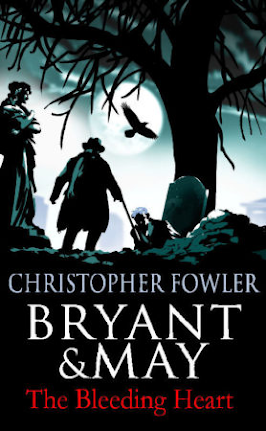Incidental
Education
It is always good for the ageing brain to have something new
to ponder. My geriatric grey matter usually wanders all over the place, mostly
thinking about nothing in particular and everything in general. That is why I
welcome books that inform me and focus my attention. Obviously, reference
books, which I have in abundance, are inestimable and well-thumbed, but it is
incidental information, that arrives by way of fiction, that I embrace.
For example, the Bryant and May series, written by Christopher
Fowler, is crime fiction, but hidden within is an intricate tapestry of
historical London. Alongside classical and occult references, the books are
stimulating and satisfying.
Similarly, the Marcus Didius Falco series, by Lindsey Davis,
has broadened my knowledge and understanding of ancient Rome and its Empire. It
is ancient history brought to fresh life and it encourages a desire to learn
more.
A recent discovery for me has been Joy Ellis’s Jackman and Evans detective series. The last one I read,
‘They disappeared’, introduced me to Urban Exploration, a fascinating pastime
and one I would rather read about than undertake.
Personally, the finest authors are those who are able to entertain
and inform and excite further research. I have spoken of fiction writers in
this post, but that last statement holds true for non-fiction writers, too, people
like Max Hastings and James Holland and Joe Simpson.
Education is a life-long enjoyable process. When curiosity no
longer holds sway the spirit begins to decline and turn in on itself.
Self-absorption is interesting only to the self.






Gail too loves fiction that provides her with 'incidental education', as well as factual material. A case in point - her book group recently read 'Songbirds' by Christy Lefteri, which sheds light on some dark corners of life in Cyprus. And just this week she finished 'Buddenbrooks' by Thomas Mann, a tremendously enjoyable (long) book focusing on a merchant family in 19th century Germany, which 'incidentally' taught her much, while avoiding any obvious lectures in European economic history!
ReplyDeleteAll recommendations gratefully taken onboard.
DeleteI am very happy that as I age I continue to learn and I continue to teach. Long may it continue thus!
ReplyDeleteAbsolutely!
Deleteagree with you about lifelong education...
ReplyDeleteI love to read "they disappeared".... sound interesting story.
Have a great day
I hope you enjoy the book.
DeleteAny well researched book with a good story (fiction or non-) is a delight to encounter and learn from. Notes have been made yo find the suggestions in your post and the comments that followed. Blog posts are a trove of reading recommendations.
ReplyDeleteI learn so much from other people's blogs. It's such a pleasure.
DeleteI've read a few fiction books that take me to places where I've enjoyed learning of them. Victorian London, Ancient Rome, the homes of the Aztecs and Incas, mostly archaeological information on those last two.
ReplyDeleteIt's a delight to come across facts in fiction.
ReplyDeleteI am away and so not participating in the world of blog, nor commenting, however I can't resist. After many years of reading factual and biographies, I discovered English crime fiction and they are so well plotted and written. They are not mindless rubbish but I read them to taken away from the realities of the world. I think I've read all Joy Ellis books and I've bookmarked this post for the future. I am presently well underway through J. M. Dalgleish books. Pssst. Pls don't tell anyone.
ReplyDeleteI feel privileged, Andrew. I like J. M. Dalgleish, too. Enjoy your break away from blogland.
ReplyDeleteAndrew, I never pictured you as a reader.
ReplyDelete